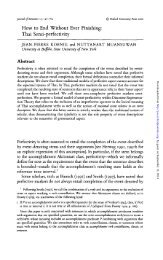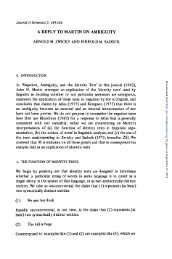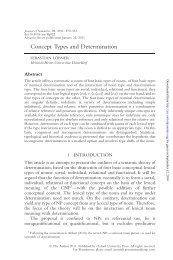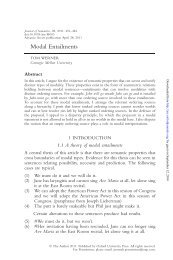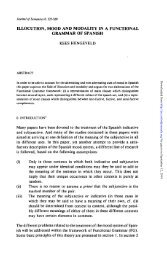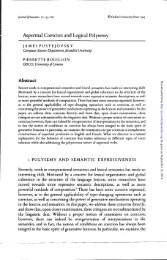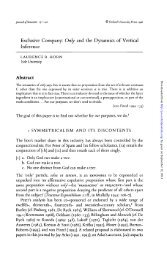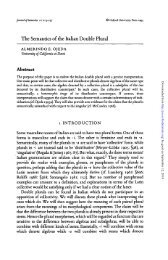Lexical Pragmatics - Journal of Semantics
Lexical Pragmatics - Journal of Semantics
Lexical Pragmatics - Journal of Semantics
Create successful ePaper yourself
Turn your PDF publications into a flip-book with our unique Google optimized e-Paper software.
128 <strong>Lexical</strong> <strong>Pragmatics</strong>(9) The Radical Underspecification View(a) Every lexical unit determines an underspecified representation (i.e. arepresentation that may contain, for example, place holders andrestrictions for individual and relational concepts).(b) The combinatorial system <strong>of</strong> language determines how lexical unitsare combined into larger units (phrases, sentences).(c) There is a system <strong>of</strong> type and sortal restrictions which determineswhether structures <strong>of</strong> a certain degree <strong>of</strong> (under)specification arewell formed.(d) There is a mechanism <strong>of</strong> contextual enrichment (pragmaticstrengthening based on contextual and encyclopedic knowledge).This inferential mechanism is controlled by cost factors and doesn'tneed triggering by type or sort violations.The mechanism <strong>of</strong> contextual enrichment carries the main burden inexplaining restrictions on interpretation. Because <strong>of</strong> its inferential character,this mechanism is structured non-compositionally. Inferential processingmust be controlled by cost factors. Such cost factors may reflect nonrepresentationalmeans as salience and relevance.* As we shall see in section 4,the idea <strong>of</strong> (radical) underspecification and contextual enrichment nicelyfits in the picture <strong>of</strong> mono tonic processing (Alshawi & Crouch 1992; vanDeemter & Peters 1996). Moreover, it is this feature <strong>of</strong> processing whichcrucially is involved in explaining pragmatic anomaly.3 LEXICAL PRAGMATICS AND THE THEORY OFCONVERSATIONAL IMPLICATUREBased on the material presented in the last section, the task <strong>of</strong> this section ismainly to evolve and propose a set <strong>of</strong> guidelines for realizing <strong>Lexical</strong><strong>Pragmatics</strong> as a proper theoretic settings. As we shall see, these guidelinesaim at a straightforward formulation <strong>of</strong> the notion <strong>of</strong> conversationalimplicature as a necessary prerequisite to develop <strong>Lexical</strong> <strong>Pragmatics</strong>.Before we are ready to speculate on what a proper treatment <strong>of</strong>conversational implicatures might be, let me first make some remarksconcerning present accounts <strong>of</strong> conversational implicatures.For Griceans, conversational implicatures are those non-truth-functionalaspects <strong>of</strong> utterance interpretation which are conveyed by virtue <strong>of</strong> theassumption that the speaker and the hearer are obeying the cooperativeprinciple <strong>of</strong> conversation, and, more specifically, various conversational maxims:maxims <strong>of</strong> quantity, quality, relation, and manner.While the notion <strong>of</strong> conversational implicature doesn't seem hard toDownloaded from http://jos.oxfordjournals.org/ by guest on September 12, 2014



